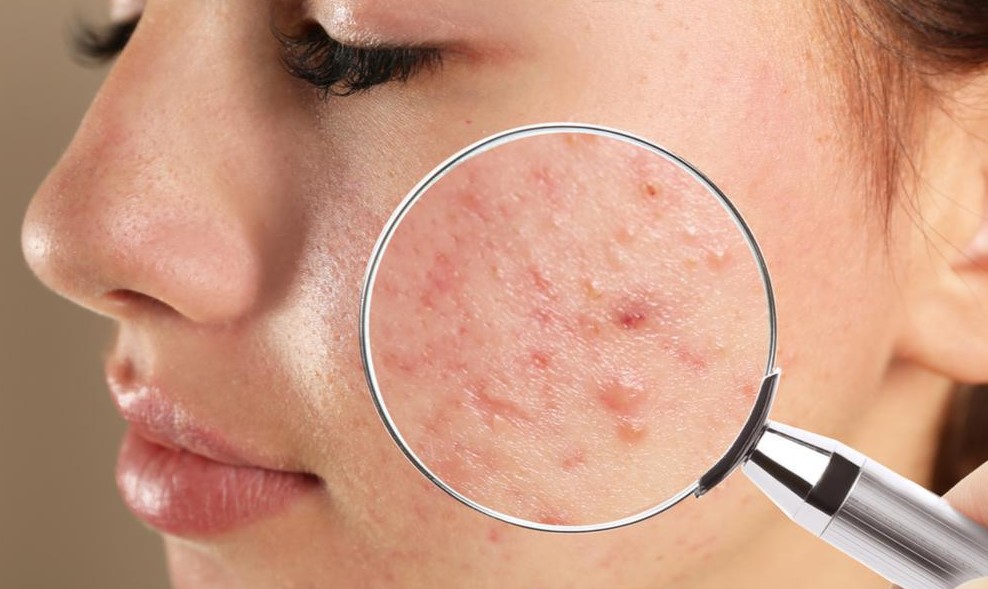Bacterial acne, also known as acne vulgaris, is a common skin condition that occurs when hair follicles become clogged with oil and dead skin cells. Bacteria, specifically Propionibacterium acnes, can then infect these clogged pores and cause inflammation, leading to the development of pimples, blackheads, whiteheads, and cysts. Here are some causes, treatments, and tips for managing bacterial acne:
Causes:
Overproduction of oil (sebum) in the skin
Hormonal changes, especially during puberty or pregnancy
Genetics
Poor hygiene
Certain medications, such as corticosteroids and androgens
Stress
Treatment:
Topical treatments: These include benzoyl peroxide, salicylic acid, and retinoids. These products can help to unclog pores, reduce inflammation, and prevent the growth of bacteria.
Oral antibiotics: If topical treatments are not effective, your doctor may prescribe an oral antibiotic, such as tetracycline, minocycline, or doxycycline, to kill the bacteria causing the acne.
Isotretinoin: For severe acne that has not responded to other treatments, your doctor may prescribe isotretinoin. This medication can help to reduce the production of oil in the skin, unclog pores, and prevent the growth of bacteria.
Light therapy: This treatment uses blue or red light to kill the bacteria causing acne and reduce inflammation.
Tips for managing bacterial acne:
Cleanse your skin twice a day with a gentle, non-comedogenic cleanser.
Avoid picking or squeezing pimples, as this can cause further inflammation and scarring.
Use non-comedogenic makeup and skincare products.
Avoid touching your face with your hands.
Avoid wearing tight clothing that can trap sweat and oil against your skin.
Manage stress through exercise, meditation, or other relaxation techniques.
In summary, bacterial acne is a common skin condition that can be treated with topical treatments, oral antibiotics, isotretinoin, and light therapy. Managing bacterial acne involves good hygiene, avoiding picking or squeezing pimples, using non-comedogenic products, avoiding tight clothing, and managing stress. If you are struggling with acne, consult with your dermatologist to determine the best treatment plan for your specific needs.
Treating moderate to severe acne
Dermatologists and skin surgeons are capable of dealing more complex problems in patients. They might prescribe gels or creams comparable to OTC medicines, but stronger oral antibiotics or topical antibiotics.
Treating children
The majority of the studies of acne medication were undertaken in young women. More kids have acne. Expanding the list of topical medications that may be used by children. The AADR recommends the use of Topical Benzoyla Peroxide, Adapalene and Taretinoin in adolescent children. If your baby is prone to acne, consult an experienced ophthalmologist. Tell me how drugs should be avoided for children, how it affects their development and their use.
Oral antibiotics
In cases of moderate to severe acne the antibiotic is administered orally at the onset. This is an attempt to decrease P. anes. This is a high dose that reduces acne after it is clear. P. acne can develop antibiotic resistance at an early age, so it's necessary to use another antibiotic. Acne may be resistant to oral antibiotic therapy if used as a topical treatment. Antibiotic drugs may help prevent bacterium growth and reduce inflammation. Erythromycin or Tetracyclin is commonly a treatment to treat acne.
Acne home remedies
There are many ways to treat acne easily. Often the treatment is not effective or even worsens acne problems. Use these simple home remedies to treat acne to prevent further problems.
Mild acne
Mild acne can be treated with overtly diluted (OTC) medications that have a gel, soap pad or gel. Cream and lotion can be used for sensitive skin. The alcohol-based gel drys the skin and helps with oily skin. Acne cream is available in a variety of different brands and uses, including emulsifying creams. The adverse effect of the medication usually subsides despite repeated use. See a physician.
Is acne treatment safe for people who are pregnant?
Most acne treatment methods can't cause serious side effects for a pregnant woman. If pregnant with an unborn child, you should contact your health care professional about acne treatment.
Moderate Acne
When a man is suffering from a whitehead, blackhead, inflamed bump, or 30 to 125 lesions the acne should be moderate. Dermatologists usually use prescribed medications for milder acne. You could notice a temporary improvement for weeks, and the acne will likely worsen a couple of hours before you feel better.
Topical Therapy
Topical therapies can treat acne directly by using gel or cream. Topical cream may be helpful for mildly acne-prone skin. It contains substances such as sulfur, salicylic acid, or benzoic acid. Some prescription medicines, like antimicrobial creams, are effective in treating moderate to severe acne. The products are prescribed individually and may be combined or alone.
Severe Nodulocystic Acne
People with severe noduloid acne often develop multiple enlarged cysts and nodules. Occasionally the acne turns dark red and purple. Sometimes scar tissue appears. Surgically, prompt treatment can reduce scarred tissue. In some instances, doctors can inject corticosteroids into nodule or cysteine tissue to decrease size and inflammation.
How does acne affect my mental health?
Acne can affect our mental well-being by altering your appearance, confidence and mood. Sometimes acne develops without hormones. It causes tension and can affect other breakouts. Acne may challenge adolescents or young adults. Symptoms of acne include anxiety and depression and can prevent you from taking part in the activities with friends or family.
Foods that cause acne
Some reports link specific foods with acne. Among other things, high-sugar foods may cause acne outbreaks. Chocolate does not cause acne at all. To reduce the chances that you will get acne, you should take a balanced, nutritious diet that contains lots of fresh fruits and vegetables.
How do antibiotics treat acne?
Antibiotics can help treat bacterial infections by targeting the immune system. Some of the medications used to treat acne reduce swelling. Bacteria may be the culprit for acne. Antibiotics help: Doctors recommend antibiotic therapy to those who have acne. Antibiotics kill the bacteria that is getting into the popping pimple and this swelling can cause pain or even swelling. This medicine is not an effective way to treat acne.
How long does it take for acne to go away?
The pimples typically disappear within a week if they aren't treated with an antibiotic or if it's just a cold. If your skin is damaged by the medication you're taking, you can reduce the chances that it will repair faster. For severe acne, the skin will usually last a few days after you have treated it.
severe acne; dead skin cells; acne treatment; benzoyl peroxide; acne vulgaris; acne scars; treating acne; treat acne; salicylic acid; moderate acne; moderate to severe acne; musculoskeletal and skin diseases; hair follicles; skin irritation; worsen acne; mild acne; sebaceous glands; acne treatments;




0 Comments:
Post a Comment